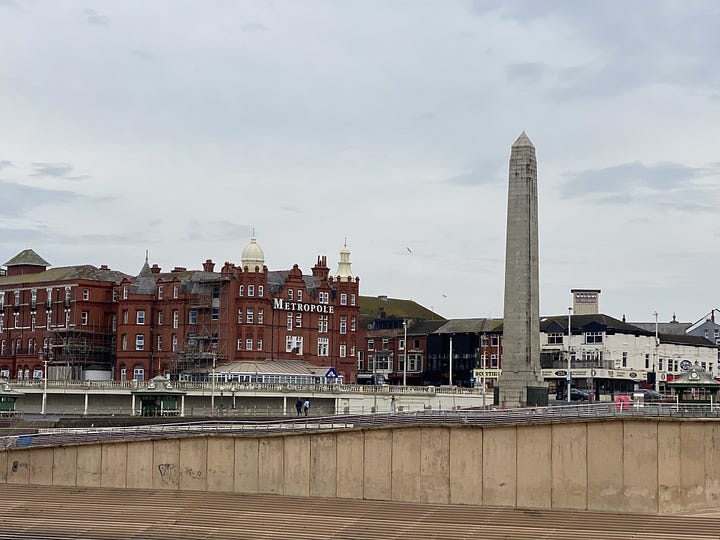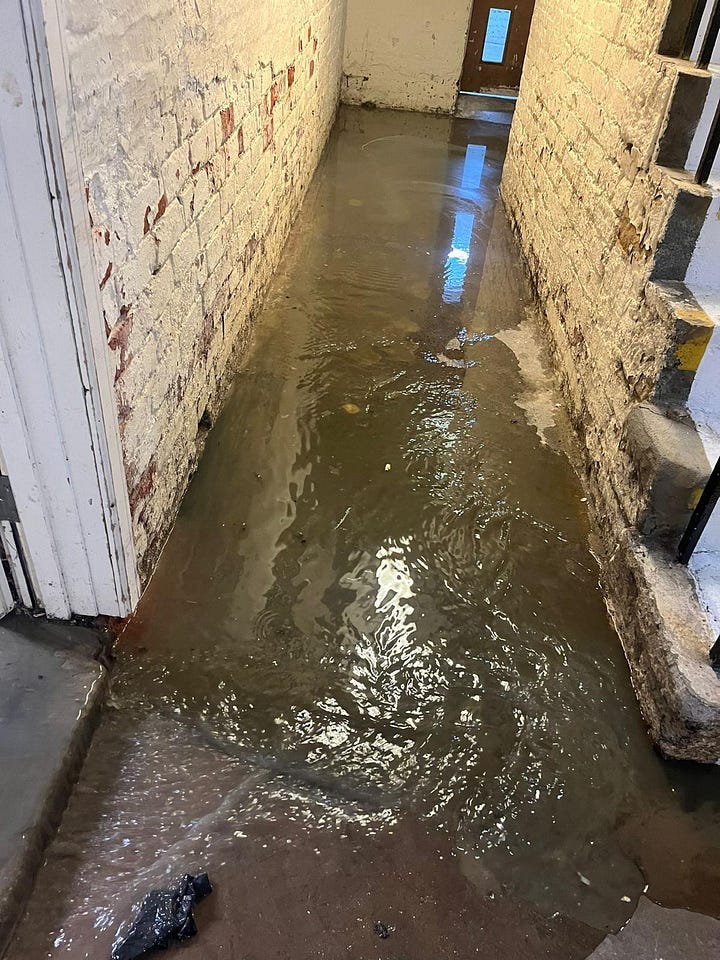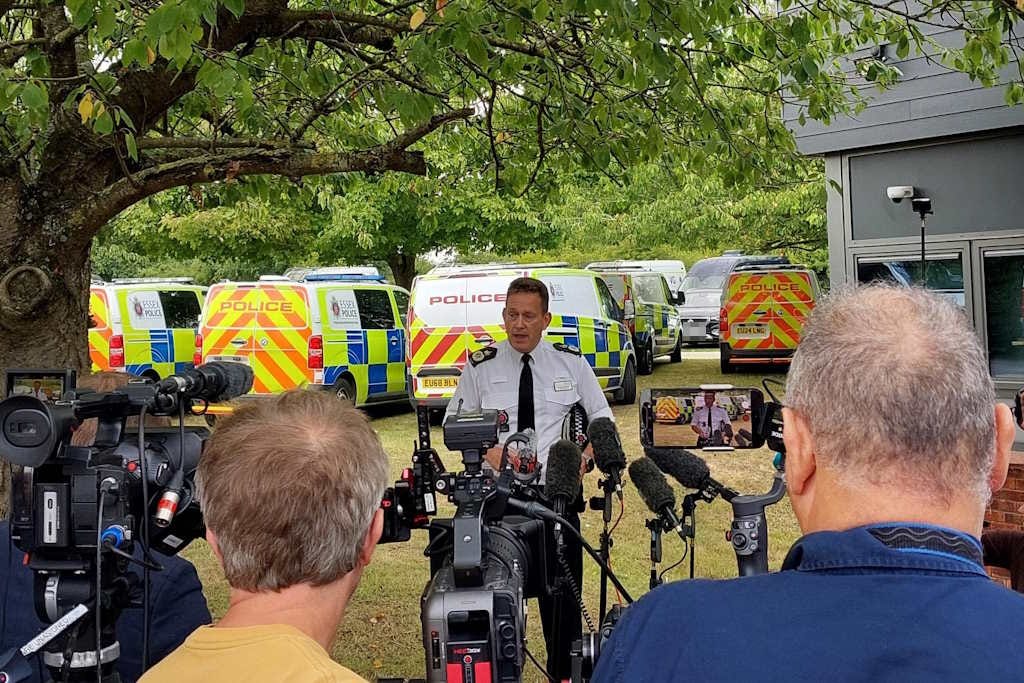Until Labour is prepared to fight, the far‑right will keep taking ground
Plus: Farage has "no idea", a whistleblower's account from inside Blackpool's Metropole Hotel, and our recommendations for what to read and listen to this week.
The images from Epping this week are frightening, but they are not inevitable.
A small, organised faction of far‑right agitators has been waiting for moments like this, prowling the edges of public anger, desperate to turn fear into violence.
What began as local outrage after an asylum seeker was charged with assaulting a young girl (an allegation he denies), has been seized on by extremists. The Times reports neo‑Nazis infiltrating protests, social media fizzes with calls to take back the streets, and Reform UK leader Nigel Farage and other high-profile commentators have been accused of fanning the flames.
And yet rather than taking them on, this Labour government is giving ground. Over the past 24 hours, Prime Minister Keir Starmer tweeted numerous times about “cracking down” and “tackling” illegal migration just as the unrest was beginning to spread to several more hotels, while Business Secretary Jonathan Reynolds told Sky News protestors were “upset for legitimate reasons”.
This is not leadership, but triangulation. And it is making things worse. Every time Labour signals that the far‑right’s framing is valid, it raises the salience of the small boats – a tiny portion of overall net migration – telling angry crowds their fury is justified, and deepening the sense that the government cannot get a grip on one of the defining issues of this time.
We know what drives disorder. The Deputy Prime Minister Angela Rayner herself admitted that it is economic insecurity, the rapid pace of de‑industrialisation, pressures on local services, technological upheaval, loneliness and collapsing trust in institutions that are reshaping our society.
Seventeen of the eighteen areas hit hardest by last summer’s disorder are among the most deprived in Britain. People are angry because their lives have been hollowed out, and with a dearth of radical solutions from government, fury keeps finding new targets, and agitators keep creating new narratives.
The answer is not to echo the far‑right’s myths, but to confront them. We may not yet be facing another summer of riots, but planned protests are set to ripple across the country in the coming weeks. And for all the noise online, their presence on the ground has so far been underwhelming: in Epping, for example, Hope Not Hate reports that a much‑touted demonstration outside The Bell Hotel drew only around 1,500 people and led to just nine arrests. These are loud, angry pocket, not a mass movement.
However, incendiary talk of “civil war”, once confined to the outer fringes of extremism, is now creeping into the language of ordinary voters, right‑wing pundits and even former government advisers. The far‑right is more organised than ever, operating across borders and weaponising social media to coordinate and amplify their message.
At home, living standards remain stagnant, and small‑boat crossings are expected to rise as the summer wears on. Should Stephen Yaxley‑Lennon – better known as Tommy Robinson – appear at Sunday’s protest, anti‑fascist campaigners warn the situation could escalate rapidly.
The government must act quickly. First, it must learn the lessons of last year: understand how the far‑right organises and develop a coherent strategy that cuts across policy, policing and local communities to prevent unrest taking hold. As Nick Lowles, CEO of Hope Not Hate explains: “It’s essential that lessons are learned from the riots last year – both by the Government and by the police.”
He tells The Lead: “We are concerned that policing has not caught up with the new post-organisation nature of the far right, where individuals can emerge and play a role on social media and inciting or directing violence, without ever being a member of a far right organisation.”
Second, the government must build an immigration system that processes asylum claims swiftly and humanely, so people are not left in limbo in hotels for months, fuelling rumours and resentment. But most importantly, it must invest in the towns that have borne the brunt of de‑industrialisation and austerity, to prove – before it is too late – that government can deliver better lives.
The far‑right may be chomping at the bit for unrest, but they remain a fringe. Most people want safety, decency and solutions. Most Britons welcome asylum seekers and want a system that is fair and orderly. Yet the government risks allowing extremists to grip disenfranchised communities unless it makes a clear, confident case that immigration is not the source of our problems.
Stand Up To Racism have already called a “No to fascist Tommy Robinson” protest in Epping next Sunday. That spirit of resistance must now be matched by those in power.■
If you want to push back, do it safely and collectively: join local counter‑protests organised by trusted groups, report hate incidents, support community initiatives, and use resources like Hope Not Hate’s guides to challenge extremism in your neighbourhood without putting yourself at risk.
About the author: Zoë Grünewald is Westminster Editor at The Lead and a freelance political journalist and broadcaster. Zoë then worked as a policy and politics reporter at the New Statesman, before joining the Independent as a political correspondent. When not writing about politics and policy, she is a regular commentator on TV and radio and a panellist on the Oh God What Now podcast.
The Lead is keeping an eye on Reform UK and their fellow travellers. Get in touch on X, Bluesky and Instagram or email ella@thelead.uk with tips and stories. We especially want to hear from readers whose local council is now run by Farage’s followers.
Nigel Farage’s claims that Essex Police “bussed” counter-demonstrators to the protest outside a migrant hotel in Epping were “categorically” false, according to the force. Farage had called for the chief constable to resign over the accusations. While officers did offer a foot cordon for people wanting to “exercise their right to protest,” and later drove some people away for their own safety, the force said, they “categorically did not drive any counter protesters to the site on any occasion.”
Farage has, in fact, defended the anti-migrant protesters in Epping, claiming most were “genuinely concerned families”. He insisted violent scenes outside the hotel were caused by “some bad eggs”. In the same breath, he warned that “civil disobedience on a vast scale” will break out unless migrants stop arriving in the UK on small boats.
It’s not just the party leader spouting inflammatory rubbish. In Lancashire, claims by the now-Preston East councillor Luke Parker that a closed care home was going to be used as accommodation for asylum seekers – made in the run up to this year’s byelection – have been debunked. L&M Healthcare, which owns the building, told The Lancashire Lead there has “never been any conversation whatsoever” about housing asylum seekers at Finney House, which is due to reopen as a care home. (Reminder: We’ll be closely following the new Reform administration in Lancashire with our dedicated title The Lancashire Lead. Make sure you subscribe to stay in the loop.)
In other misinformation, Farage also claimed the crime survey for England and Wales is based on completely false data. Which isn’t true. And another false claim: Farage said the party has saved £1m in IT costs since taking charge at West Northamptonshire Council [WNC]. This is untrue and “hard to validate” according to the authority, as reported by the NN Journal.
On a political level, lying through his teeth is probably better than admitting he has “no idea” about his party’s councils. Which he did, six times, in an interview with Laura Kuenssberg on the BBC, when asked about Scarborough Town Council increasing its mayor’s allowance by 600 per cent, despite his party promising to cut costs for taxpayers.
Despite all of the nonsense, Reform now has its very first Senedd member in Wales, as Laura Anne Jones this week announced she was defecting from the Tories and joining Reform UK. Two other Welsh Conservative councillors have defected, too, including Thomas Montgomery and Louise Emery, both councillors in Conwy.
As we know, Reform cares about putting money back into taxpayer’s pockets. That’s why the party footed the bill for a £350 bottle of champagne at a luxury lunch and a £989-a-night hotel, according to its election campaign spending data. Receipts submitted to the Electoral Commission show instances of high spending at top London venues in the first half of last year, including £1,703 spent at the Shard restaurant and a £1,367 stay at Sea Containers, a hotel on London’s South Bank, plus £99 on “dinner liquor” and £205 on room service and the minibar.
The Lead Digest
Earlier this month, Luke recommended Kirsty Bosley’s writing on Ozzy Osbourne after his final gig at Villa Park. Now, she's written beautifully for longstanding Brummie newsletter IChooseBirmingham about his death.
Natalie has been gripped and horrified by the first two episodes of the new podcast from Tortoise Investigates. The Lab Detective tells the story of the women who lost children to Sudden Infant Death Syndrome, only to be accused of their murder. It's about how misogyny and myths of 'perfect' motherhood can lead to miscarriages of justice.
She also enjoyed this article by Vicky Spratt in the New Statesman, on Labour's plans to fix the housing crisis this autumn. It has left her tentatively optimistic that there might be a pinprick of light at the end of a very long, dark tunnel.
Zoe recommends a new investigation from Politico uncovering how former British spies are selling their expertise to private intelligence firms with deep ties to the government. It’s a rare look at the shadowy world where Whitehall meets the private sector, and why it matters for security and accountability.
Finally, Ella read this fascinating long-read in the New Yorker about the seemingly untreatable psychiatric symptoms that may actually stem from treatable autoimmune conditions. There’s nothing like a new discovery – particularly from right under our noses – to inject a bit of hope.
Why I spoke out: A whistleblower’s account from inside the Metropole
By Samantha Arden
When I started working at the Metropole Hotel in Blackpool, I genuinely believed I could help people – both the asylum seekers stuck in limbo and the staff trying to support them. But it didn’t take long to see the truth: the system is broken, the building’s crumbling, and Serco couldn’t care less about any of us.
The hotel, run by Britannia, had been neglected for years. Ceilings leaked. The heating barely worked. We wore coats and hats through 12-hour shifts in winter. There was mould, damp, broken windows. No one should have to live – or work – in conditions like that.


The residents were families, elderly people, disabled individuals. Babies being raised in one overcrowded room. Some had been trapped in that hotel for over three years, waiting endlessly for a decision on their asylum claim. They weren’t allowed to work. They received just £9.95 a week on their Aspen card. Their lives were on hold, and it was destroying them.
Staff were breaking down too. Serco housing officers and Securitas guards worked punishing 12-hour shifts, rotating days and nights. Wages were often wrong or missing. Grievances went nowhere. Britannia hotel workers faced the same daily chaos, but for even less pay. The mental health toll was massive – for everyone.
The system grinds people down. It dehumanises residents and staff alike. Serco just wants boxes ticked. Britannia wants to keep the contract. No one in charge actually cares. I reached my limit and resigned. Then I spoke out – to the press, on social media, and to an MP – because someone had to.
And despite what headlines say, the people in that hotel aren’t living in luxury. They’re surviving in rot and neglect, forgotten by a government that made this mess and refuses to fix it. It can be fixed.
Let asylum seekers work. Give them a chance to contribute instead of forcing them into dependency. Open safe, legal routes so people aren’t risking their lives or being exploited by traffickers. Treat the workers in this system with respect – pay them properly, support their mental health, and stop letting private companies profit from suffering.
This isn’t just about immigration. It’s about basic humanity. A system this broken helps no one – not the people fleeing danger, not the staff trying to help, and not the communities left to pick up the pieces.
We deserve better. All of us.■
Make sure you’re subscribed to the The Blackpool Lead to receive our full report on this story – in which Arden reveals more of the horrors inside the Metropole – in this Sunday’s newsletter.
Tomorrow we will be sticking with the far-right, as Lauren Crosby Medlicott digs into falling birth rates in the UK, and how this very real issue is being weaponised. Then on Saturday we will share the trailer for a powerful new short documentary on the traumatic impact of the police power of stop and search – and we will have the exclusive premier of the full film early in August.
If you’re reading this and you’re not signed up, consider subscribing to The Lead below so you don’t miss our upcoming editions. Thanks for reading our Thursday newsletter, it’s great to have you with us.
Zoe, Luke, Natalie, Ella, Ed, Padraig, and The Lead team.







The only thing Labour can fight is the disabled.